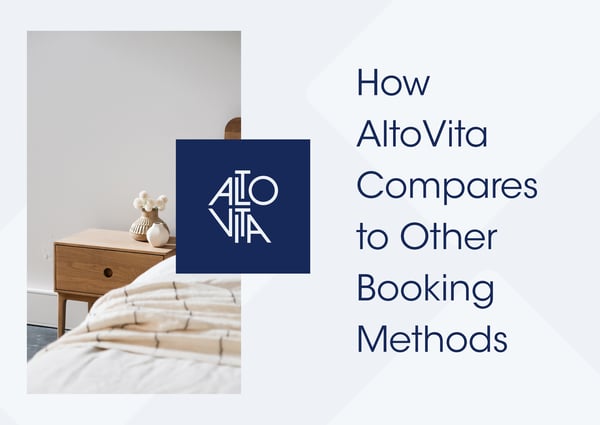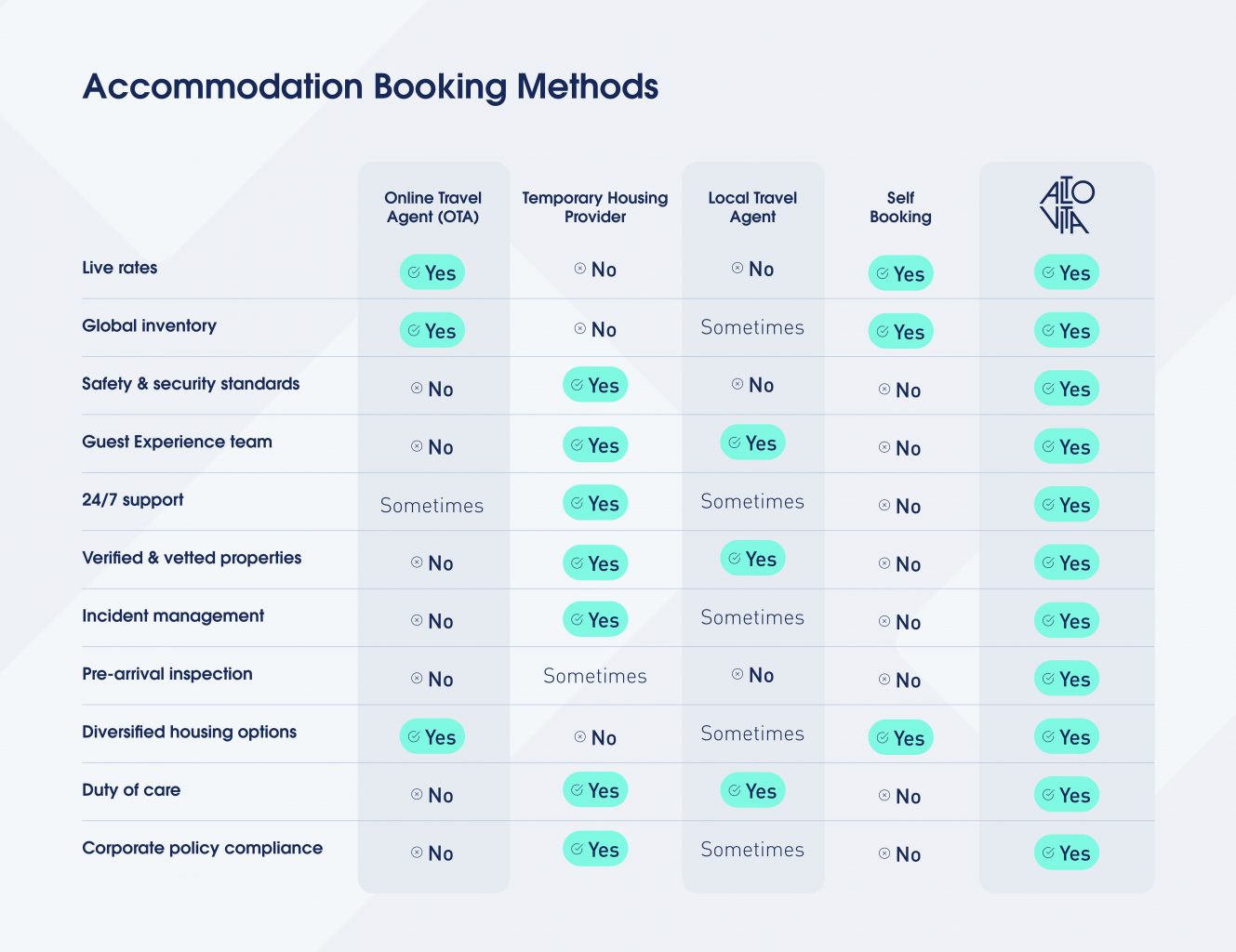
In today’s globally connected world, the consumer is rich with choice. When it comes to travel and booking short-term or mid-term accommodations, the consumer has a wealth of options: Online travel agents, temporary housing providers, local travel agents, self-booking, and cloud-based enterprise software platforms. How does one decide which avenue to pursue? Here, we break down the benefits and drawbacks of each booking method.
Navigating the Different Booking Methods

Online Travel Agent (OTA)
An OTA is a web-based marketplace that allows consumers to research, plan, and book various elements of travel, including hotels, flights, cars, tours, cruises, activities, and more. The OTA acts as a middleman between travel providers and consumers, and these providers often pay a commission in order to be listed on the marketplace. In order to rank high on the OTA’s search, operators are required to pay a higher commission rate, creating a bias for the consumer.
OTAs thrive on volumes and typically house millions of housing options. These platforms plug into a Global Distribution System (GDS) to source live availability and content. Instant booking is supported, alongside in-app guest/operator messaging.
However, accommodations are not supported by customer care teams or verified and vetted in advance. The onus is on the consumer to self-evaluate the safety and security of the accommodation, manage any incidents that arise while on property, and, for business travellers, ensure the rate, cancellation policy and billing are compliant to corporate policies.
OTAs are suitable for leisure and short stays. Many do to support extended stay bookings over 30+ days.
Temporary Housing Providers
These platforms are operated by a temporary housing agent, solely for B2B purposes and serve the extended stay business accommodation market. Unlike OTAs, which offer hundreds of thousands of global options with live rates, temporary housing platforms are more curated and specialised for a certain type of traveller.
Many focus exclusively on one type of housing or another – say, serviced apartments only, or extended stay hotels only. Alternative accommodations such as vacation rentals, single-family homes, villas, and co-living are typically not supported. This is due to the fact that all properties listed need to meet safety and security measures, and have to go through some level of vetting (though typically not in person) in order to be listed.
The inventory available varies from platform to platform. Some have a database of operators around the world, but most are highly localized (say, only operating in the United States), or only active in a handful of counties.
These platforms often come with some level of customer support, including pre-check in communication.
The biggest drawback to using a temporary housing provider is that they do not provide instant, live rates. These tools offer inventory on their marketplace based on the partnerships they have with property managers and operate within a “bid system.” This means that when a request is made, a representative from the sourcing tool company will email a request to book to the property. The highly manual process can take 24-72 hours to complete, and in the meantime another consumer or client could have booked the property, starting the process all over again. The consumer is required to make a selection based on a number of PDFs received (or sometimes an excel sheet) with limited property and amenity details.
The minimum length of stay supported is typically 30-60 days. Short stays are not supported.
Local Travel Agent
The benefit of local travel agents is in the name – they are experts in their local area. They will (or at least, should) know the complete ins and outs of everything going on in the city and surrounding region. They can provide high-touch concierge service and recommendations on everything from where to stay to where to dine and what to do. Local travel agents aim to take the stress out of planning by handling all logistics.
Local travel agents are typically focused on short stays and providing traditional accommodation solutions (hotels). Within this, accommodations recommended will meet their client’s needs and budget.
What a local travel agent can provide will vary from service to service. Some have a wide footprint and can plan travel around the world, though most are specific to a city. Agents do not have live rates and availability, but rather work with their partners and conduct old-fashioned research to source accommodation. Given this and their personalised approach, local travel agents often come at a higher cost than any other booking solution.
Self Booking
Ah, the freedom of complete control. But with this freedom comes more manual time spent researching, sourcing, and booking accommodation and increased uncertainty about that accommodation.
When you self-book, you can utilise any platform or method you prefer – sourcing tool, OTA, direct from a company’s website, et cetera – which opens the door to limitless options all over the world, and to any type of housing option you desire, from apartments to hotels to homes. But this can be where the benefits end.
Self booking does not offer peace of mind with approved safety and security standards, help from guest experience and 24/7 support teams, access to verified and vetted properties, incident management assistance, pre-arrival inspection of the accommodation, duty of care, or integrated corporate policy compliance.
This remains a popular method for short stays. However, booking extended stays is more complex and often requires additional support, such as discount, payment term negotiation, and verification of quality standards.
Enter AltoVita, the Only Booking Platform That Offers Live Technology with Commitment to Safety & Security
About AltoVita
AltoVita is an award-winning corporate housing platform for the flexible rentals market sector. Thanks to AltoVita’s Business to Employee (B2E) interface and proprietary technology, corporate clients and consumers gain instant access to a network of 1 million+ diversified properties across 165 counties and 800+ cities. All properties – inclusive of serviced apartments, single-family homes, villas, co-living, and hotels – are verified and vetted, and backed by a two-tier quality control process to ensure duty of care for all guests.
Corporate clients love the bespoke user interface seamlessly configured to their mobility policies, and employees enjoy a greater sense of choice and support in their relocation journey.
The Cloud-Based Enterprise Software Model
AltoVita’s robust system connects seamlessly to hundreds of thousands of property management systems (PMS) around the world – key partnerships the AltoVita team has made in order to simplify and consolidate the historically fragmented property distribution markets. The innovative software fetches data points such as property description, amenities, locations, pricing, and real-time calendar availability directly from the PMSs into its cloud-based system, creating instant booking ability.
The technology-first solution eliminates legacy manual processes and data entry, reducing a historical 24-72 hour process down to just 3 minutes – saving corporate clients up to 80% in relocation costs and consumers the headache of trying to book vetted accommodation. This technology-first solution offers the most up-to-date information, fast for today’s modern client and traveller.
The cloud-based content is pushed to AltoVita’s B2E client interface along with live rates and instant booking ability. Our powerful whitelable API removes the need for our clients to rebrand with email, spreadsheet, and PDF, which results in a user-friendly interface with bespoke workflow suitable for sub-policies for relocation purposes (from fully managed, core-flex, managed budget, and lump-sum) and budget-driven policies for client engagement and project assignment extended stay purposes.
The innovative technology also includes the following proprietary features to make the relocation process even easier:
• Integrated communication tool
• Customisable performance scorecard
• Customisable reporting
• Aggregated billing & invoices
• Streamlined incident management & escalation
• Data analytics for a balanced overview of budget
• Budget setting and approval
• Referral fee auto-calculation for relocation & travel partners
Ensuring Duty of Care
AltoVita demonstrates its commitment to duty of care by pioneering a meticulous two-tier quality control standard at scale, with a pre-inspection protocol within 24 hours of arrival. This allows AltoVita’s dedicated Guest Experience teams to be accountable and proactive as well as streamlines auditing or incident management processes.
Live photos and videos of the walk-through are uploaded into the AltoVita system to verify that all amenities are present and the condition of the property is in line with quality standards and duty of care compliance. Assisted by a centralised database and detailed evaluation methodology, performance of property operators is continuously monitored. AltoVita actively engages and empowers its supply network through reporting, training sessions, and 1:1 evaluation sessions.
During the booking process, a live chat feature allows consumers, clients, and employees to connect with the 24/7/365 Reservations Team who curates housing options in real time.

Benefits of Staying in a Serviced Apartment
Previous Article
Product Launch Day 2: Europe, Middle East & Africa
Next Article


